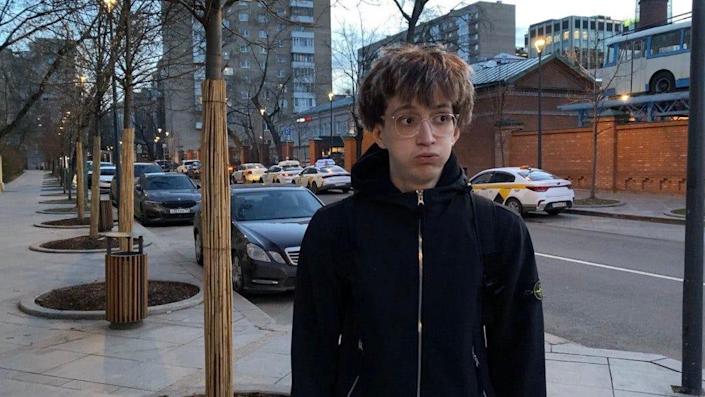
-
Daniil Orain is a YouTuber from Russia who runs the channel “1420”.
-
Orain’s videos focus on asking everyday questions to people in Moscow. This now includes questions about Ukraine.
-
This is the story of Orain, told to writer Stefano Montali.
This as-told essay is based on a transcribed conversation with Daniil Orain, a YouTuber from Russia. It has been edited for length and clarity.
My name is Daniel Oraine. I am a YouTuber from Russia and manage the channel ‘1420’. In my videos I try to make a montage of everyday Russians and a transparent representation of what they believe.
Since the beginning of the conflict in Ukraine, people from all over the world have come to my channel to try to understand how Russians think.
Before starting the channel about two years ago, I had some skewed thoughts about the world
At the time, I was working as a software engineer with a three-hour commute, and my perspectives changed when I started watching interviews with people in distant cities during those street trips. Those videos showed me how people from different places and cultures think, and they played a big part in my tutorial.
I started to wonder: why is something like this not on YouTube, but with people from Russia, like me? Then my friend and I made 1420.
People often ask me about the story behind the channel’s name, but there is no secret meaning. It’s just the name of the school we went to together. Our whole purpose with the station was to take to the streets of Moscow and ask people questions that interested us – things like “Do you believe in God?” or “What do you think of Americans?”
When the conflict in Ukraine started, we suddenly saw a huge increase in viewers
Our increase came from all over the world – not just Europeans and Americans, who were previously our main audience. With the increased viewership, I decided to double down and publish videos daily.
I’ve hired a few people to help; my team of six consists of editors, translators and someone in Moscow who asks the questions. Recently, we’ve asked things like, “What do you think of Ukrainian President Volodymyr Zelenskyy?” “Do you want Ukraine to become part of Russia?” and “Do you feel the sanctions now?”
To get enough material for a full video, we need to ask a large number of people. Given the nature of our topics at the moment, many people are refusing to participate.
For example, when shooting the Zelenskyy video, we had 124 people who refused to answer. Only 28 people agreed. Even if they do agree, they often hold back from giving their full opinion.
Making these videos is risky, but we haven’t had any problems so far
Unlike TikTok and Instagram, access to YouTube in Russia is still normal. In the videos I always muted certain words (but kept the subtitles) to avoid censorship.
For example, you should not say ‘war’ when referring to the situation in Ukraine. We should say “covert operation” instead. So when someone says “war,” we mute that particular word.
Some people in the comments have accused me of being a Russian propaganda channel, so I had to find new ways to show that I’m not. For example, in a recent video, we blurred the faces and changed the voices of the people in them so that they could be honest without fear of repercussions. We also started showing longer, continuous clips of the interviews so that viewers don’t think we cut them on purpose to tell a particular story.
Not only have I seen a change in how people see our channel since the war – there’s a change in how they see our participants
Recently, the comments on my YouTube videos said things like, “Russians are just like us.” But as the situation in Ukraine has progressed, they now tend to say more: “Russians have been brainwashed.”
I’m glad people are watching the videos because I know from personal experience how useful YouTube can be. We are fortunate to be able to learn online.
You will notice in my videos that there is quite a clear gap between the answers of people who grew up in Soviet times and the younger people. As the older generations grew up, they were taught only by books or teachers – they had no access to the world like people my age. The position I’m in, running this channel, wouldn’t even have existed then.
Nowadays you can learn things from websites, videos and even comments
Last week, on one of my own videos, a viewer wrote, “You’re not scared, not because you’re fearless, but because you just haven’t been scared yet.”
That disappointed me. I know what I’m doing is risky, but maybe I don’t worry about it because I’ve never really worried that much. But at the same time I am only the narrator. Many people message me to ask for my opinion on various topics, but I don’t answer them.
I see my role as the person who helps to tell people’s stories, and I will continue to do so to show how and what Russians feel.
Read the original article on Business Insider

